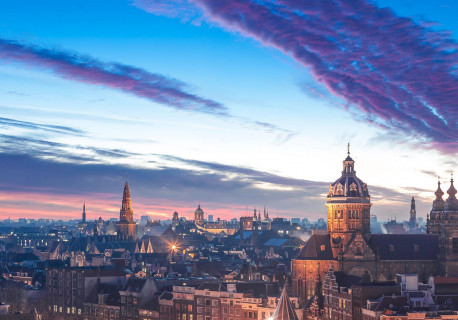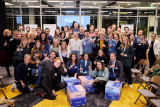In 2017, the city of Amsterdam carried out two circular programs: Amsterdam Circular, Learning by doing and the complementary Circular Innovation Program (2016-2018). At the beginning of 2018, the evaluation of these programs show that the circular economy is a realistic and profitable concept. Article in English and Dutch.
Below in Dutch / Lees onderaan verder voor Nederlands
Full evaluation in Dutch can be found here
Amsterdam is seen (inter) nationally as frontrunner
The approach to learning by doing, in which the municipality, market parties and knowledge institutions share their experiences with each other, appears to be successful. There has been active and interdisciplinary cooperation in the preparation of the programs, in their implementation and in the validation of the evaluation. 73 projects were evaluated and more than 100 market parties were involved in the validation. The evaluation and market validation show that Amsterdam continues to cement its international reputation as a pioneer and leader in the field of circular economy. There is evidence that a circular economy is realistic and profitable. The current municipal approach to Learning by Doing and the commitment to the value chains for construction and biomass is successful.
Transition to a circular economy more commonplace The transition from a linear economy based on the 'take, make and throw away principle' to a model of 'reduce, reuse and / or recycle' is becoming increasingly common. Started from the Sustainability, Innovation and Economy portfolios, the principles are now being dealt with more broadly in their own organization and in the city. However, the transition is still in the phase where a group of front-runners is implementing the system changes. Sharing knowledge from both the municipality and market parties is of great importance for accelerating the transition. The municipality of Amsterdam shared, among other things, knowledge as chairman of the circular economy task force of Eurocities, an international partnership of large cities. The pioneering role of the municipality of Amsterdam was appreciated. This is evident from winning the international World Smart City Award in November 2017. And the requests they receive from other cities to support them in shaping their programs.
Action perspectives It is important that as a next step a larger group will be involved. Simply by sharing knowledge and simply by doing it. The evaluation provides five tools for this in the form of concrete action perspectives:
Scale value chain construction
Scale up the value chain biomass and food
Upscaling the value chain for consumer goods
Expand the purchase of purchasing instrument
Expand deployment research, information provision
It is up to the next board to determine what the next steps are and to make priorities and or a choice from this.

In 2017 heeft de gemeente Amsterdam twee circulaire programma’s uitgevoerd: Amsterdam Circulair, Leren door te doen en het complementaire Circulair Innovatieprogramma (2016-2018). Begin 2018 heeft het College deze programma’s geëvalueerd en ze komt met een voorstel voor de inzet voor 2018. Doel van beide programma’s was al doende aan te tonen dat de circulaire economie een realistisch en rendabel concept is. Uit de evaluatie komt naar voren dat dat inderdaad het geval is.
Amsterdam wordt (inter)nationaal gezien als koploper
De aanpak van leren door te doen, waarbij gemeente, marktpartijen en kennisinstellingen de ervaringen breed met elkaar delen, blijkt succesvol. Er is actief en interdisciplinair samengewerkt bij het opstellen van de programma’s, bij de uitvoering daarvan en bij de validatie van de evaluatie. Er zijn 73 projecten geëvalueerd en bij de validatie zijn meer dan 100 marktpartijen betrokken. De evaluatie en marktvalidatie tonen aan dat Amsterdam (inter)nationaal wordt gezien als koploper. Er is bewijskracht geleverd dat een circulaire economie realistisch en rendabel is. De huidige gemeentelijke aanpak van Leren door te Doen en de inzet op de waardeketens bouw en biomassa is succesvol.
Transitie naar een circulaire economie meer gemeengoed
De transitie van een lineaire economie gebaseerd op het 'neem, maak en weggooi principe' naar een model van 'verminderen, hergebruiken en/of recyclen' wordt steeds meer gemeengoed. Gestart vanuit de portefeuilles Duurzaamheid, Innovatie en Economie, worden de principes nu breder in de eigen organisatie en in de stad opgepakt. De transitie zit echter nog in de fase waarin vooral een groep koplopers de systeemveranderingen doorvoert. Kennisdeling zowel vanuit gemeente als marktpartijen is van groot belang voor versnelling van transitie. De gemeente Amsterdam deelde onder meer kennis als voorzitter van de task force circulaire economie van Eurocities, een internationaal samenwerkingsverband van grote steden. De voortrekkersrol van de gemeente Amsterdam werd gewaardeerd. Dit blijkt uit het winnen van de internationale World Smart City Award in november 2017. En de verzoeken die ze van andere steden krijgen om hen te ondersteunen bij het vormgeven van hun programma’s.
Handelingsperspectieven
Het is zaak dat er nu een volgende, grotere groep bij wordt betrokken. Simpelweg door kennis te delen en gewoon door het te doen. De evaluatie reikt daarvoor vijf handvatten aan in de vorm van concrete handelingsperspectieven:
- Opschalen waardeketen bouw
- Opschalen waardeketen biomassa en voedsel
- Opschalen waardeketen consumptiegoederen
- Uitbreiden inzet inkoop instrument
- Uitbreiden inzet onderzoek, informatievoorziening
Het is aan het volgende bestuur om te bepalen wat de volgende stappen zijn en hieruit een keuze te maken.
Lees de volledige evaluatie hier: <https://www.amsterdam.nl/wonen-leefomgeving/duurzaam-amsterdam/publicaties-duurzaam/amsterdam-circulair-1/>





